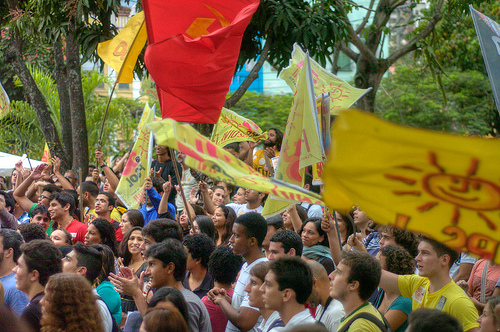As part of its quadrennial electoral process, Brazil held simultaneous local elections on Sunday in over 5,560 municipalities. In all, roughly 140 million votes were cast—normal turnout, since voting is mandatory in Brazil. Voters chose from among nearly 480,000 candidates to determine the mayors (prefeitos), deputy mayors (vice-prefeitos) and local councils (vereadores) across the country.
Local Brazilian elections play an important role in the country’s development. Unlike many countries in the region, mayors have significant political power and are crucial partners in the delivery of public goods—from street paving to stadium building. In this sense, the recent elections were of particular prominence since elected officials will contribute disproportionately to the success or failure of both the 2014 FIFA World Cup and 2016 Summer Olympic Games.
Municipal elections also shape other electoral processes, as Brazil’s many political coalitions—a consequence of an excessive number of political parties—often trace their roots to local politics. Brazilian law prevents coalitions from forming at the presidential level unless they exist at the state level. With 23 parties having at least one representative in the lower chamber of Congress, coalitions allow for parties to pool their cumulative support in order to qualify for more TV airtime, among other things, in Brazil’s highly regulated campaigning structure.
Going into Sunday’s election, there were a number of important questions to consider: Who would ultimately be in charge of the municipalities at the heart of the Olympic and World Cup efforts? What would be the rate of re-election?1 Would President Dilma Rousseff’s popularity translate into the Partido dos Trabalhadores (PT) winning more mayoral contests? The success of the ruling PT in municipal elections would be a bellwether for its overall national strength at a time of stalling economic growth and public scrutiny over the PT’s role in the 2005 mensalão corruption scandal has revived public scrutiny involving the PT and a number of its allied parties.
From the PT perspective, the results were mixed in regard to what the elections mean for the World Cup and Olympic Games. In Rio de Janeiro, Eduardo Paes—the incumbent mayor who was strongly backed by both former Brazilian President Lula da Silva and President Rousseff—won re-election easily, taking an impressive 65 percent of the vote with the support of all but one neighborhood in the city. However, Rousseff’s favored candidates lost two important World Cup host cities—Belo Horizonte and Recife—to the Partido Socialista Brasileiro (PSB), a party formerly under its coalition, and the Partido da Social Democracia Brasileira (PSDB). Belo Horizonte was particularly damaging, since it is the city where President Rousseff is from and the race was seen as a proxy for the 2014 presidential election.
Mayoral elections in the remaining seven World Cup host cities will be decided in a runoff scheduled for October 28. The remaining races look competitive for President Rousseff’s coalition—with the possible exception of Manaus, where the PSDB candidate held a nearly 20 percentage point lead on its opponent.
Beyond World Cup cities, Rousseff can be pleased with some aspects of the electoral results. Her party took the largest vote share, even though the PT came in third in the number of mayorships (627 municipalities). This represented a 14 percent increase from 2008, with many elections still to be decided in runoffs. Meanwhile, the Partido do Movimento Democrático Brasileiro (PMDB)—a party in Rousseff’s national coalition—took the largest number of mayorships (1016 municipalities).2
Just as important, her party has an opportunity to pick up the ever-important city of São Paulo, last held by the PT in 2005 after Fernando Haddad, the PT candidate, made it to the second round despite struggling in the polls throughout the campaign.
But more worrisome for Rousseff is that the PT performed rather poorly when in direct competition with the PSB in the Northeast. Not only did the PT lose in Recife and Belo Horizonte, but the PSB won the mayorships in Pernambuco, Ceará and Piauí—giving the PSB the largest jump in the number of mayorships in the states cited. These losses are damaging to the PT, which means it is possible that journalists and pundits will in the short term see Rousseff’s re-election chances as notably diminished.
But such predictions are premature. Rousseff maintains a high approval rating, the PT’s coalition did well enough geographically to maintain its turnout machine, and more importantly, there will be plenty of opportunities for the government to burnish its reputation and target benefits to voters as part of the preparations for the World Cup and the Olympics. In Brazilian politics, these factors matter much more than which party label won what jurisdiction. Then again, all bets are off if the delays and controversies associated with Brazil’s upcoming international events continue and if scrutiny grows toward the Rousseff administration.
FOOTNOTES
1 In 2000 and 2004, less than 60% of those who decided to run again were reelected, whereas 2008, a much better year in economic terms, resulted in a close to 70% rate of reelection.
2 The PMDB is Dilma’s largest partner in her Congressional coalition, and as such a crucial partner in governing, but the coalition has not always seen eye to eye, and could see fragmentation as 2014 gets closer.







